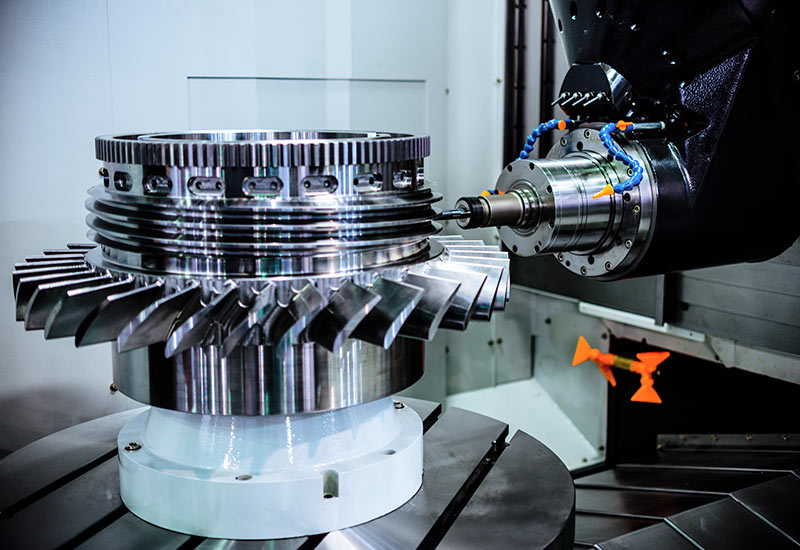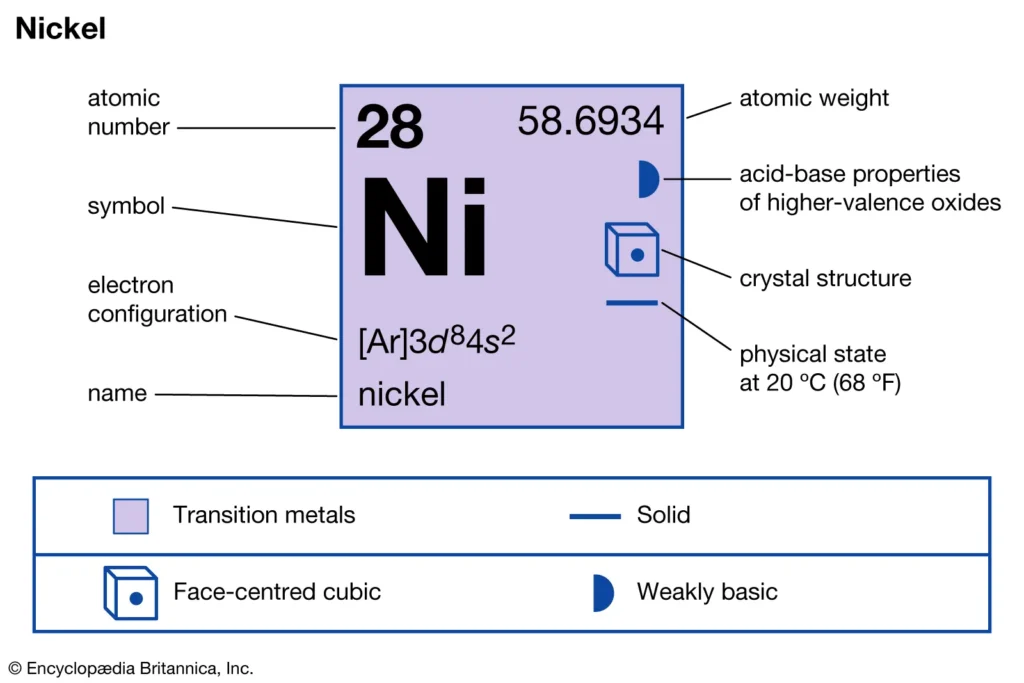La guía definitiva sobre piezas fundidas de aleación de níquel y fundición de níquel
Tabla de contenido
Introducción

Fundición de níquel y piezas fundidas de aleación de níquel son esenciales para componentes metálicos de alto rendimiento. Estas piezas fundidas ofrecen Resistencia, resistencia a la corrosión y estabilidad a altas temperaturas, lo que los hace ideales para las industrias aeroespacial, química, energética y médica.
Ejemplo: Las palas de turbina fabricadas a partir de piezas fundidas de aleación de níquel mantienen su forma y rendimiento incluso en condiciones calor extremo y estrés operativo.
Qué es NíquelPropiedades y beneficios de las piezas fundidas

El níquel como metal
El níquel es un metal de transición de color blanco plateado con un alto punto de fusión (~1455°C), ductilidad, y resistencia natural a la corrosión.
Cómo el níquel mejora las piezas fundidas
Cuando se añade a las aleaciones, el níquel Mejora la fuerza, la tenacidad y la resistencia al desgaste., al mismo tiempo que proporciona resistencia a la oxidación.
Ejemplo: El níquel en las carcasas de las turbinas evita la oxidación durante la exposición prolongada a gases calientes, lo que prolonga la vida útil de los componentes.
Comprensión Fundiciones de aleación de níquel
Definición y descripción general
Fundiciones de aleación de níquel son componentes creados por fundición aleaciones fundidas a base de níquel en moldes. Combinando níquel con metales como cromo, molibdeno o cobalto Mejora el rendimiento para aplicaciones específicas.
Níquel puro vs. aleaciones a base de níquel
Las piezas fundidas de níquel puro se prefieren para aplicaciones químicas y marinas debido a la resistencia a la corrosión. Sin embargo, las aleaciones a base de níquel ofrecen mayor resistencia y durabilidad Para usos sometidos a altas tensiones o altas temperaturas.
Ejemplo: Las piezas fundidas de aleación de Monel se utilizan ampliamente en bombas y válvulas manipulación de soluciones ácidas, mientras que las piezas fundidas de Inconel se eligen para turbinas de motores a reacción.
Beneficios de Fundiciones de níquel
Resistencia a la corrosión
Las piezas fundidas de aleación de níquel resisten oxidación, herrumbre y ataque químico, haciéndolos confiables en entornos hostiles.
Ejemplo: Las bombas de fundición Hastelloy pueden funcionar durante más de 10 años en plantas químicas sin degradación significativa.
Rendimiento a altas temperaturas
Estas piezas fundidas mantienen resistencia mecánica y estabilidad dimensional Incluso por encima de 1000°C, crucial para motores y turbinas.
Ejemplo: Los álabes de turbinas de gas fabricados con piezas fundidas de Inconel resisten funcionamiento continuo a alta temperatura Sin deformaciones.
Resistencia y resistencia al desgaste
El níquel mejora resistencia a la tracción, tenacidad y dureza, prolongando la vida útil de los componentes en aplicaciones mecánicas exigentes.
Ejemplo: Las piezas fundidas Nimonic en motores a reacción resisten arrastrarse y fatiga, garantizando fiabilidad después de miles de horas de vuelo.
Tipos de aleaciones de níquel y aplicaciones


Inconel para calor extremo
Las piezas fundidas de Inconel proporcionan Resistencia a altas temperaturas y resistencia a la oxidación, ideal para álabes de turbinas aeroespaciales.
Monel para entornos corrosivos
Las piezas fundidas de Monel se destacan en aplicaciones marinas y químicas, ofreciendo resistencia a ácidos, sales y álcalis.
Hastelloy para estabilidad química
Las piezas fundidas de Hastelloy se mantienen integridad mecánica bajo tensión y proporcionar resistencia química superior, adecuado para reactores y equipos de proceso.
Nimonic para componentes de alta temperatura
Oferta de fundición Nimonic resistencia a la fluencia y estabilidad dimensional, utilizado en motores a reacción y turbinas de gas.
Tabla comparativa: Rendimiento de las aleaciones de níquel
| Aleación | Resistencia a la corrosión | Resistencia a altas temperaturas | Resistencia a la tracción (MPa) | Aplicación típica |
|---|---|---|---|---|
| Inconel | Alto | Muy alto | 1100 | Álabes de turbinas, motores aeroespaciales |
| Monel | Muy alto | Medio | 580 | Equipos marinos, bombas químicas |
| Hastelloy | Extremadamente alto | Alto | 750 | Reactores, equipos nucleares |
| Nimónico | Medio | Extremadamente alto | 950 | Motores a reacción, turbinas de gas |
Esta tabla proporciona datos cuantitativos para ayudar a los ingenieros a seleccionar el La fundición de aleación de níquel más adecuada basado en la resistencia, resistencia a la corrosión y temperatura de funcionamiento.
Fabricación Fundiciones de níquel
Fundición en arena para componentes grandes
Usos de la fundición en arena moldes de arena Para dar forma a aleaciones de níquel fundido, adecuadas para carcasas de bombas o piezas estructurales.
Fundición de precisión para piezas de precisión
Fundición de precisión, o fundición a la cera perdida, crea geometrías intrincadas Con alta precisión. Ideal para álabes de turbina o componentes aeroespaciales.
Fundición centrífuga para piezas cilíndricas
La fundición centrífuga utiliza la rotación para producir Componentes tubulares o cilíndricos densos y sin defectos, como tubos y anillos.
Ejemplo: Las válvulas complejas de aleación de níquel en las plantas químicas se funden mediante fundición de inversión para garantizar Canales internos lisos y resistencia a la corrosión..
Aplicaciones de Fundiciones de aleación de níquel

Aeroespacial y aviación
Fundiciones de aleación de níquel se utilizan en álabes de turbina, cámaras de combustión y componentes de escape, dónde Resistencia a altas temperaturas y resistencia a la fluencia son esenciales.
Industria química y marina
Las bombas, válvulas y recipientes de reactores dependen de piezas fundidas de aleación de níquel para Resistencia a la corrosión por ácidos y soluciones salinas.
Sector energético
Las turbinas de gas y los componentes de los reactores nucleares se benefician de estabilidad dimensional y fiabilidad a largo plazo proporcionado por piezas fundidas de níquel.
Equipo médico
Instrumentos quirúrgicos e implantes fabricados a partir de piezas fundidas de aleación de níquel mantener Nitidez y resistencia a la corrosión después de repetidos ciclos de esterilización.
Mantenimiento y longevidad
Medidas de limpieza y protección
La limpieza de rutina elimina los depósitos, mientras que los recubrimientos protectores reducen oxidación y desgaste, prolongando la vida útil.
Consideraciones sobre altas temperaturas
Evite el choque térmico para prevenir microfisuras que pueden comprometer la integridad estructural.
Inspección periódica
La inspección regular garantiza desgaste, corrosión bajo tensión o defectos superficiales se detectan de forma temprana, manteniendo confiabilidad a largo plazo.
PREGUNTAS FRECUENTES
¿Cuál es la diferencia entre? nickel casting y nickel alloy casting?
La fundición de níquel es principalmente níquel puro, mientras que la fundición de aleación de níquel contiene metales adicionales Para mejorar resistencia, resistencia al desgaste o resistencia a la corrosión.
Why are nickel castings more corrosion-resistant than steel?
El níquel forma una capa de óxido protectora estable, evitando la oxidación y la degradación química, incluso en ambientes ácidos o salinos.
¿Qué aleación de níquel es mejor para aplicaciones de alta temperatura?
Inconel y Nimonic ofrecen Resistencia superior y resistencia a la fluencia a temperaturas superiores a 1000°C.
Poder nickel castings be used in chemical plants?
Sí. Aleaciones como Monel y Hastelloy. Resiste ácidos, bases y productos químicos agresivos., asegurando una larga vida útil.
How do I select the right nickel alloy casting for my project?
Considerar rango de temperatura, exposición a la corrosión, carga mecánica, geometría y costo. Las tablas de comparación ayudan a identificar la aleación óptima.
Conclusión
Fundiciones de aleación de níquel y nickel casting offer exceptional corrosion resistance, high-temperature performance, strength, and wear resistance. They are crucial for aerospace, chemical, energy, and medical industries.
By understanding nickel properties, alloy types, casting methods, and applications, engineers can choose the right material, optimize workflow, and extend component lifespan. Proper maintenance ensures reliable performance in demanding environments.
Manténgase conectado con nosotros

¡Gracias por leer! Esperamos que este blog te haya brindado información valiosa e inspiración sobre techos con paneles acústicos. Si disfrutaste del contenido y quieres estar al día de las últimas tendencias, consejos y novedades, nos encantaría conectar contigo en redes sociales.
📘 Síguenos en Facebook: Shanghai Leierwo Industria Comercio Co., Ltd.
Únase a nuestra creciente comunidad donde compartimos consejos de expertos, aspectos destacados de los productos y debates interactivos con profesionales y entusiastas del diseño de todo el mundo.
Sigamos conversando, ¡nos vemos allí!
Categorías de productos
- Piezas de válvulas
- Piezas de la bomba de agua
- Piezas de la caja de cojinetes
- Piezas de fundición a presión
- Productos para bombas de acero inoxidable
- Productos para bombas de hierro fundido
- Piezas de válvulas para automóviles
- Recambios para automóviles
- Piezas de válvulas para uso civil
- Piezas de bomba de vacío KF

